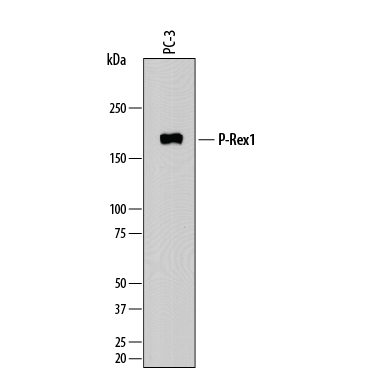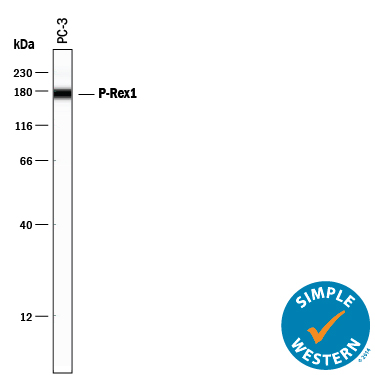Human P-Rex1 Antibody Summary
Lys1313-Arg1434
Accession # Q8TCU6
Applications
Please Note: Optimal dilutions should be determined by each laboratory for each application. General Protocols are available in the Technical Information section on our website.
Scientific Data
 View Larger
View Larger
Detection of Human P-Rex1 by Western Blot. Western blot shows lysates of PC-3 human prostate cancer cell line. PVDF membrane was probed with 0.5 µg/mL of Mouse Anti-Human P-Rex1 Monoclonal Antibody (Catalog # MAB8076) followed by HRP-conjugated Anti-Mouse IgG Secondary Antibody (Catalog # HAF018). A specific band was detected for P-Rex1 at approximately 180 kDa (as indicated). This experiment was conducted under reducing conditions and using Immunoblot Buffer Group 1.
 View Larger
View Larger
Detection of Human P-Rex1 by Simple WesternTM. Simple Western lane view shows lysates of PC‑3 human prostate cancer cell line, loaded at 0.5 mg/mL. A specific band was detected for P-Rex1 at approximately 175 kDa (as indicated) using 5 µg/mL of Mouse Anti-Human P-Rex1 Monoclonal Antibody (Catalog # MAB8076). This experiment was conducted under reducing conditions and using the 12-230 kDa separation system.
Reconstitution Calculator
Preparation and Storage
- 12 months from date of receipt, -20 to -70 °C as supplied.
- 1 month, 2 to 8 °C under sterile conditions after reconstitution.
- 6 months, -20 to -70 °C under sterile conditions after reconstitution.
Background: P-Rex1
PREX1 (phosphoinositol (3,4,5)-dependent Rac exchanger 1), also called P-Rex1, is a 185 kDa G-protein-activated guanine nucleotide exchange factor. It is mainly cytosolic, but also plasma membrane-associated, regulating cell motility and actin dynamics in neutrophils, migrating neurons, adipocytes and platelets. It is upregulated in cancers such as melanoma, prostate and breast. The 1659 amino acid (aa) human P-Rex1 contains DH, PH and tandem DEP GPCR signaling domains, and a PDZ scaffolding domain between aa 49-703. A 956 aa isoform with a 5 aa substitution for aa 1-703 is reported, and a 1561 aa isoform with a 91 aa substitution for aa 1471-1659 is predicted. The human P-Rex1 immunogen (aa 1313-1434) shares 94% and 95% aa sequence identity with mouse and rat P-Rex1, respectively.
Product Datasheets
FAQs
No product specific FAQs exist for this product, however you may
View all Antibody FAQsReviews for Human P-Rex1 Antibody
There are currently no reviews for this product. Be the first to review Human P-Rex1 Antibody and earn rewards!
Have you used Human P-Rex1 Antibody?
Submit a review and receive an Amazon gift card.
$25/€18/£15/$25CAN/¥75 Yuan/¥1250 Yen for a review with an image
$10/€7/£6/$10 CAD/¥70 Yuan/¥1110 Yen for a review without an image

